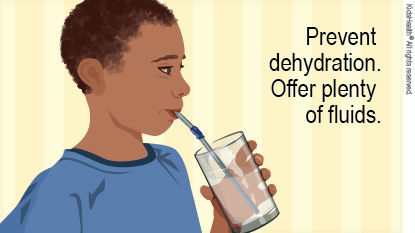Diarrhea: How to Care for Your Child After Being in the Hospital
Diarrhea is poop that's loose, watery, or happens a lot. Kids who have diarrhea lose a lot of fluid from the body through their poop. When too much fluid is lost, kids can get dehydrated, which means they don't have enough water in the body.
While in the hospital, the health care team gave your child intravenous (IV) fluids for rehydration. They may have done some tests, like a stool culture or blood tests. Your child now can be cared for at home. It might take some time for the diarrhea to get better. Help your child stay hydrated until the diarrhea stops.


-
Offer plenty of drinks to replace lost fluids. A good option is an oral rehydration solution. It has the right amount of water, sugar, and salt for kids. Brand names include Pedialyte® and Enfalyte®, and many stores also have a store brand. You can buy it at drugstores or supermarkets without a prescription. You also can give frozen electrolyte pops. Broth is another good option.
-
Don't offer juice, sodas, or sports drinks. They can make diarrhea worse.
-
It may take some time for your child's appetite for solid foods to return to normal. Offer a regular diet as soon as your child feels comfortable.
-
Don't give medicine to stop the diarrhea unless your health care provider prescribed it.

Your child:
-
has diarrhea that gets worse
-
develops a fever
-
vomits (throws up) more than once or twice
-
has blood or mucus in the poop, or poop that is black and looks like tar

Your child:
-
can't drink fluids
-
has severe belly pain
-
appears dehydrated; signs include dizziness, drowsiness, dry or sticky mouth, sunken eyes, crying with few or no tears, or peeing less often (or having fewer wet diapers)

What causes diarrhea? Infections in the intestines cause most cases of diarrhea. Germs that can cause an infection include:
-
viruses (viral gastroenteritis, also known as "stomach flu," is the most common cause of diarrhea in kids)
-
bacteria (bacteria are often the cause of food poisoning)
-
parasites
Sometimes diarrhea can be unrelated to germs. This can happen in kids who eat or drink too much sugar (like juices), or who have food allergies or intolerances. It also can happen as a side effect of some medicines.
How can we prevent the spread of germs that cause diarrhea? Remind everyone in your family to wash their hands well and often. They should wash for at least 20 seconds with soap and water. This is especially important after using the bathroom and before preparing or eating food.
Other ways to prevent the spread of germs:
-
Keep your child out of school or child care until the diarrhea has been gone for 24 hours. Also keep your child out of swimming pools until it has stopped.
-
Clean objects and surfaces regularly, especially doorknobs and other things that get touched a lot.
-
Wash fruits and vegetables well before eating them.
-
Clean kitchen counters and cooking utensils well after they've been in contact with raw meat.
-
Refrigerate meats and fish as soon as you bring them home from the store and cook them well. Refrigerate leftovers as soon as possible after cooking.
-
Avoid drinking from streams, springs, or lakes.